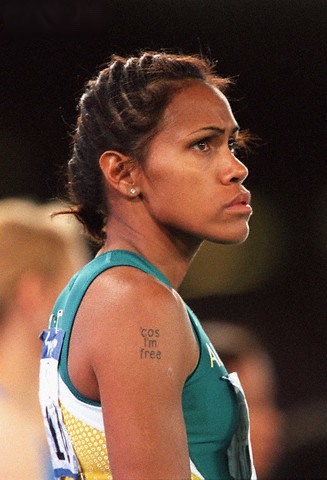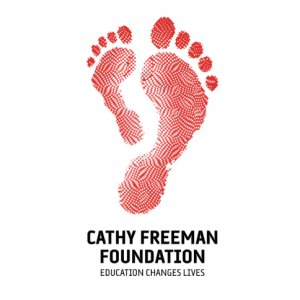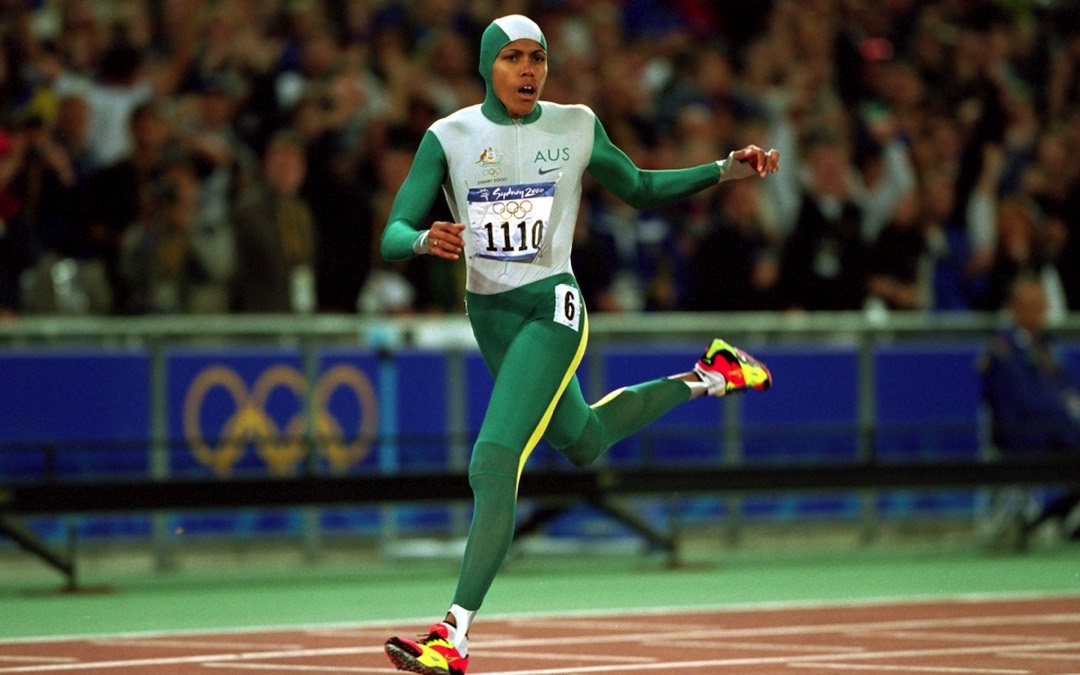Written by Amity Delaney – Runner’s Tribe
Cathy Freeman is one of Australia’s most successful runners. She was also one of Australia’s most decorated Indigenous athletes. She was significant, both in terms of her athletic accomplishments, and also for the achievements she garnered as an Indigenous athlete. I watched her achieve her most prolific medal when I was just five years old when she won the 400m at the Sydney Olympic Games in 2000.
She began athletics when she was just two years old. She was coached by her step-father, and under his guidance, she won a host of regional and national titles as a junior in events such as the 100m, 200m, high jump and long jump.
 In 1987 she moved to Kooralbyn International School to be coached by Mike Danila. By 1989 she had run a personal best of 11.67 seconds in the 100m event. She was a member of the impressive Australian 4 x 100m relay team that won gold at the 1990 Commonwealth Games in Auckland. This performance made Freeman the first Australian Indigenous person to achieve a medal at the Commonwealth Games. She also won this Commonwealth Games medal when she was just sixteen years old.
In 1987 she moved to Kooralbyn International School to be coached by Mike Danila. By 1989 she had run a personal best of 11.67 seconds in the 100m event. She was a member of the impressive Australian 4 x 100m relay team that won gold at the 1990 Commonwealth Games in Auckland. This performance made Freeman the first Australian Indigenous person to achieve a medal at the Commonwealth Games. She also won this Commonwealth Games medal when she was just sixteen years old.
As a junior, she represented Australia at numerous World Junior Championship events. At the 1990 Championships in Bulgaria, she reached the semi-finals of the 100m and placed 5th in the 400m. At her second World Junior Championships in South Korea in 1992, she won a silver medal in the 200m.
At the 1992 Olympic Games, she reached the second round of the 400m. At the 1994 Commonwealth Games in Canada, she won gold in both the 200m and the 400m. She also placed second in the 4 x 100m relay and placed first but was disqualified in the 4 x 400m relay. As of the year 1994, she had a personal best of 50.04 seconds in the 400m, 11.24 seconds in the 100m and 22.25 seconds in the 200m.
https://youtu.be/Xoiv1h7Z-00
The 1996 Olympic Games 400m race was one of Freeman’s most spectacular races of her career. She set an Australian record, running a time of 48.63 seconds. This time is still the sixth fastest time ever and the second fastest since the world record was set in Canberra in 1985. She finished in second place behind Marie-Jose Perec, who won in a time of 48.25 seconds. This is the current Olympic Record and the third fastest time ever.
https://youtu.be/MpG6GIsUy4I
She also achieved great success at World Championship events throughout the years. Freeman reached the semi-final of the 200m at the 1993 World Championships. At the 1995 World Championships, she finished fourth place in the 400m and once again reached the semi-final of the 200m. She came first in the 400m at the 1997 World Championships in Athens in a time of 49.77 seconds. During 1997 Freeman only lost one 400m the entire year. She again won the 400m at the 1999 World Championships, after taking an injury break the previous year. She didn’t lose a single race in 1999 after returning from injury.
https://youtu.be/dNIUk9Kju9s
The highlight of Freeman’s career was, of course, the 400m Olympic Title she won at the 2000 Olympic Games in Sydney. It was the race that stopped the nation. Despite all the pressures and expectations placed upon Freeman, she rose to the challenge and won the gold medal. She won in a time of 49.11 seconds, becoming only the second Australian Aboriginal Olympic champion. Due to this success, she carried the Olympic flag for Oceania at the next Olympics.
 In 2002, she won the 4 x 400m relay at the Commonwealth Games. She announced her retirement from athletics the following year.
In 2002, she won the 4 x 400m relay at the Commonwealth Games. She announced her retirement from athletics the following year.
Cathy Freeman also achieved success in non-athletic endeavours. In 2007 she founded the Cathy Freeman foundation. This foundation works with four remote Indigenous communities to close the education gap with non-aboriginal Australians. She was an ambassador of the Australian indigenous education foundation until 2012 and was also an ambassador for Cottage by the sea until 2014.
Cathy Freeman was one of Australia’s most prolific athletes. She achieved numerous accolades throughout her career. She is remembered not only for her talent and success as an Australian athlete but also for the success she achieved as an Aboriginal athlete.




Percy Hobson who won Gold medal in high jump at Perth Commonwealth Games in 1962 was reported at the time as first indigenous person to win Commonwealth Gold.